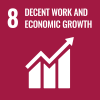Lamphun Province, 8 November 2023 – Hailing from a small village in eastern Myanmar, 33-year-old Boon has spent almost half of his life working in the agricultural sector in northern Thailand. His road to get there was riddled with difficulties going back to his childhood. His parents separated when he was young, leaving him under the care of his father while his mother migrated to work in Thailand.
Without having a chance to complete his higher education, Boon had to leave his village and become a monk at a temple up town. The experience was short-lived as conflict later broke out in the region, leaving him no choice but to move back home. As the conflict continued to escalate, it adversely affected the economy in Myanmar, leading to widespread economic stagnation and soaring unemployment rates.
Determined to pursue a better life free from fear and poverty, Boon joined his mother in Thailand, where she was a daily worker, taking up menial jobs to survive. Working in a field plucking longan and guavas not only allowed Boon to earn a stable income and support his mother but also brought him closer to migrant communities striving to improve their livelihoods. However, being in a foreign country with an unfamiliar language comes with its own set of challenges.
“Lack of access to information on labour rights and migration processes is what drives many migrant workers like us to go through broker channels – leading to debt and exploitation,” says Boon as he gears up for the training organized by the International Organization for Migration (IOM) in collaboration with the Human Rights and Development Foundation (HRDF).
Freshly plucked guavas from farms are passed around as he arrives at the training centre, along with 15 other migrant community leaders in Thailand’s Lamphun Province, ready for another day of legal assistance training on labour rights and entitlements as a migrant worker.
“There were days when we did not have enough money to buy clothes. My mother, despite her busy work shifts, would take out time to weave clothes for me,” he recounts fondly. “I was determined to support my mother any way I could.”

Agriculture has historically been the backbone of the Thai economy, while being heavily reliant on migrant workers. Photo: IOM 2022/Javier Vidal
Since 2022, IOM has been supporting government and civil society partners to provide migrant workers with accurate, up-to-date information on labour laws and policies through community outreach and training. Topics covered include safe migration, access to justice and social services, labour rights and entitlements, employment procedures, among many others.
“Understanding labour and migration laws and regulations in any country is complex. But the language barrier adds another layer of difficulty,” he says. “Trainings like these not only help us understand our rights but also encourage us to access justice for rights violations.”

IOM and authorities from the Ministry of Justice engage migrant community leaders in accessing justice funds when reporting grievances. Photo: IOM 2023/Anushma Shrestha
“Migrant workers who experience rights violations face multiple barriers that make it hard to access effective grievance mechanisms. Often, existing mechanisms are not accessible to migrant workers. It is possible that they fear dismissals or deportation when they file a grievance,” said Maximillian Pottler, Head of Labour Mobility and Social Inclusion at IOM Thailand.
“Training migrant workers on how to access and navigate existing grievance mechanisms and where to get support is the first step for them to receive more effective remediation and achieve decent working conditions.”
Having faced legal obstacles when registering for a work permit in Thailand, Boon understands firsthand the risks of losing one’s legal status and the information gaps migrant workers struggle with to work and live in the country.
“We believe that the best way to reach migrant communities is through migrants themselves. Using a Training-of-Trainers (TOT) approach, we train selected migrant community leaders who can then guide other migrants on how and where to seek information and legal assistance,” explains Sai Kyaw Win Mynt, Educational Officer at HRDF.

Boon shares the challenges he faced when registering for a work permit without any help. Photo: IOM 2023/Anushma Shrestha
Boon strongly believes that knowledge has the power to foster self-reliance among migrant workers. “Accurate information and skills help migrant workers not only to understand the root cause of a problem but also identify solutions and take affirmative action in overcoming these barriers,” he says.
He is determined to share his newly acquired knowledge with his fellow community members, so they do not have to go through the same obstacles he experienced and can realize their full potential.

Boon expresses his resolve to continue helping fellow migrants access justice. Photo: IOM 2023/Anushma Shrestha
To date, he has supported five migrant workers in his community on how to register for a work permit extension, regularization and accessing social security funds.
Boon hopes to encourage every migrant worker in his community to become independent, so they can access their rights and seek legal assistance for labour rights violations. As the training wraps up, Boon shares his love for fruit farming and his aspirations to someday open his own guava farm in Myanmar, so he can create more job opportunities in his home country.
IOM Thailand’s community outreach to migrant communities on legal assistance was made possible through funding from the Government of Japan.
This story was written by Anushma Shrestha, IOM’s Associate Communications Officer in Thailand.



